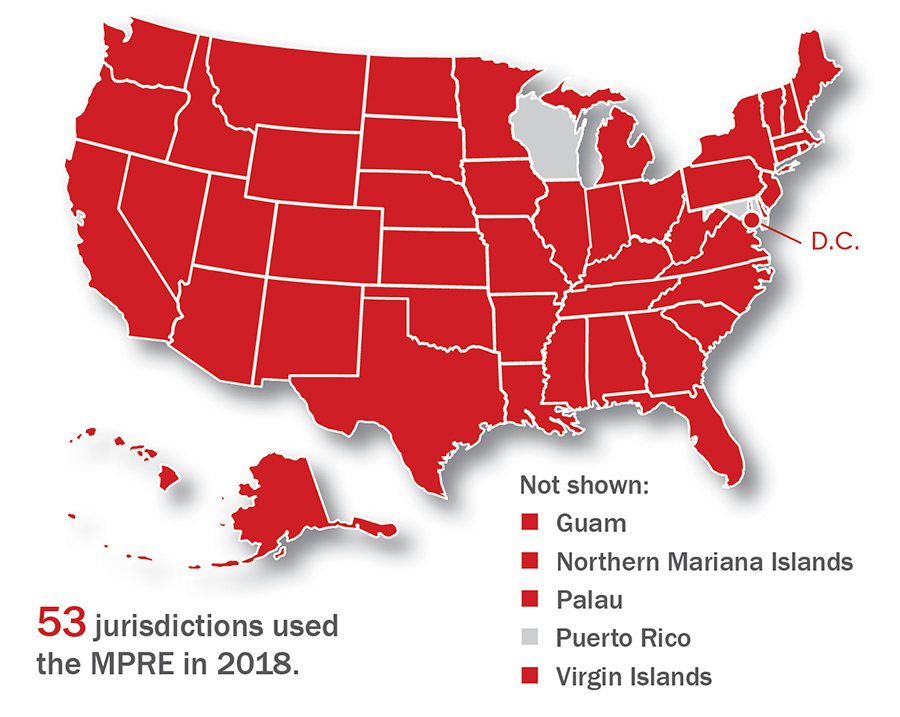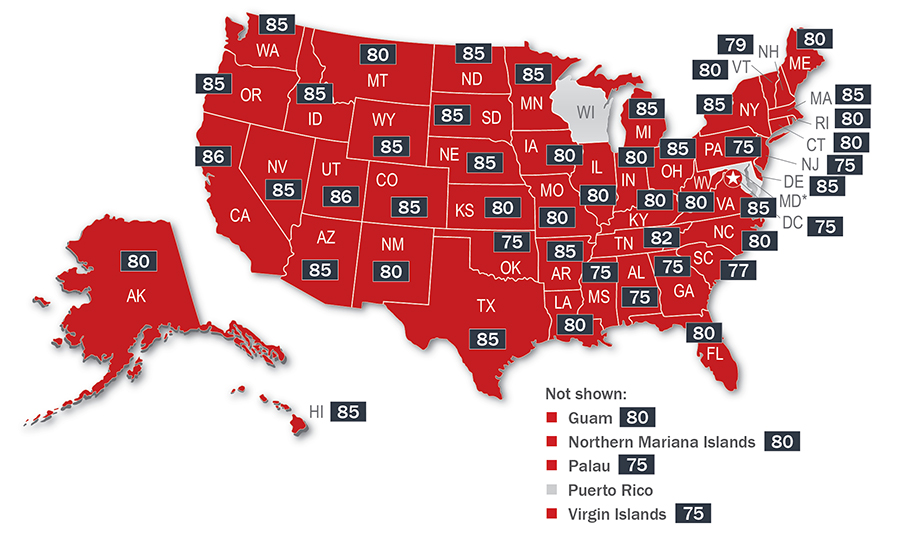The Multistate Professional Responsibility Examination (MPRE)
The National Conference of Bar Examiners has produced the Multistate Professional Responsibility Examination (MPRE) since 1980.
The MPRE consists of 60 multiple-choice questions whose scope of coverage includes the following: regulation of the legal profession; the client-lawyer relationship; client confidentiality; conflicts of interest; competence, legal malpractice, and other civil liability; litigation and other forms of advocacy; transactions and communications with persons other than clients; different roles of the lawyer; safekeeping funds and other property; communications about legal services; lawyers’ duties to the public and the legal system; and judicial conduct. The purpose of the MPRE is to measure examinees’ knowledge and understanding of established standards related to the professional conduct of lawyers.
The MPRE scaled score is a standard score. Standard scaled scores range from 50 (low) to 150 (high). The mean (average) scaled score was established at 100, based upon the performance of the examinees who took the MPRE in March 1999. The conversion of raw scores to scaled scores involves a statistical process that adjusts for variations in the difficulty of different forms of the examination so that any particular scaled score will represent the same level of knowledge from test to test. For instance, if a test is more difficult than previous tests, then the scaled scores on that test will be adjusted upward to account for this difference. If a test is easier than previous tests, then the scaled scores on the test will be adjusted downward to account for this difference. The purpose of these adjustments is to help ensure that no examinee is unfairly penalized or rewarded for taking a more or less difficult form of the test. Passing scores are established by each jurisdiction.
Jurisdictions Using the MPRE in 2018

NOTE: Maryland began requiring the MPRE effective March 1, 2019.
Minimum Passing MPRE Score by Jurisdiction in 2018

MPRE Minimum Passing Score by Jurisdiction in 2018
File "/var/www/vhosts/thebarexaminer.ncbex.org/httpdocs/wp-content/uploads/2019/04/Minimum-Passing-MPRE-Score-by-Jurisdiction-in-2018-WPD2.xlsx" does not exist.
† Kentucky’s MPRE minimum passing score of 80 became effective for applicants taking the exam after July 1, 2017; for scores earned before that date, the previous minimum passing score of 75 will continue to be honored.‡ Tennessee’s MPRE minimum passing score changed to 82 effective for examination applicants with the July 2018 bar examination, replacing a score of 75. Re-examination applicants not licensed in another jurisdiction may continue to use a score of 75 until they are successful on the bar exam or the MPRE score expires, whichever is earlier. For examination applicants licensed in another jurisdiction and with an otherwise expired score, the minimum MPRE score effective with the July 2018 bar examination was 82, regardless of whether they were first-time or re-examination applicants. Applicants successful on a bar examination prior to July 2018 and not yet admitted will be eligible for admission with an MPRE score of 75 or higher as long as they are admitted prior to expiration of their bar examination scores.
2018 MPRE National Summary Statistics (Based on Scaled Scores)
Note: The values reflect valid scores available electronically as of 2/15/2019 on both standard and alternative forms of the MPRE.
File "/var/www/vhosts/thebarexaminer.ncbex.org/httpdocs/wp-content/uploads/2019/04/2018-MPRE-National-Summary-Statistics-Based-on-Scaled-Scores-WPD2.xlsx" does not exist.
2018 MPRE National Score Distributions
Note: The values reflect valid scores available electronically as of 2/15/2019 on both standard and alternative forms of the MPRE.These data represent scaled scores in increments of 10. For example, the percentage reported for 70 includes examinees whose MPRE scaled scores were between 70 and 79. Percentages may not sum to 100% due to rounding.Jurisdictions’ minimum passing MPRE scores in 2018 ranged from 75 to 86: 75 (9 jurisdictions), 77 (1 jurisdiction), 79 (1 jurisdiction), 80 (19 jurisdictions), 82 (1 jurisdiction), 85 (20 jurisdictions), 86 (2 jurisdictions).
File "/var/www/vhosts/thebarexaminer.ncbex.org/httpdocs/wp-content/uploads/2019/04/2018-MPRE-National-Score-Distributions-WPD1.xlsx" does not exist.
MPRE National Examinee Counts, 2009–2018
Note: The values reflect valid scores available electronically as of 2/15/2019 on both standard and alternative forms of the MPRE.
File "/var/www/vhosts/thebarexaminer.ncbex.org/httpdocs/wp-content/uploads/2019/04/MPRE-National-Examinee-Counts-2009–2018-WPD1.xlsx" does not exist.
MPRE National Mean Scaled Scores, 2009–2018
Note: The values reflect valid scores available electronically as of 2/15/2019 on both standard and alternative forms of the MPRE.
File "/var/www/vhosts/thebarexaminer.ncbex.org/httpdocs/wp-content/uploads/2019/04/MPRE-National-Mean-Scaled-Scores-2009–2018-WPD1.xlsx" does not exist.






